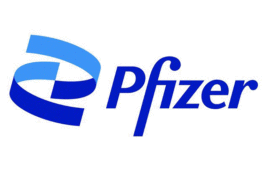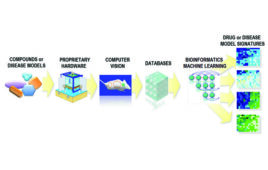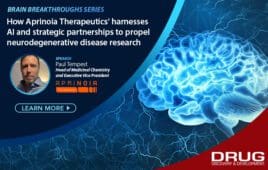Only 12% of new drug candidates that enter phase 1 clinical development ultimately receive FDA approval. This dismal success rate leaves millions of patients with unmet medical needs and drives up the costs for the small number of drugs that make it to market. More frustratingly, it leaves untold numbers of potentially transformative therapies back-burnered…
Supercomputer-based Bayesian approach to AI pays dividends for BPGbio
In an AI hype-filled biopharma industry, one company is taking a back-to-basics yet supercomputer-powered approach — using Bayesian analysis on massive patient datasets to guide drug discovery. The company crunches trillions of data points per patient. “It’s massive, which is why we use a supercomputer,” said Niven R. Narain, Ph.D., BPGbio CEO. The company has…
Using AI to unlock new uses for existing cancer medicines
Repurposing is a drug development strategy that has been widely applied in cancer. This strategy, sometimes called label expansion, involves obtaining FDA approval to market a drug for the treatment of new indications, alone or in combination with other drugs. Not only can this approach extend the window of patent protection for a commercialized drug,…
Two-thirds of pharma companies plan to up IT investments in 2024, survey finds
Two out of three pharma companies (67%) plan to ramp up investment in IT, including AI, over the next 12 months, according to a survey from the cloud vendor Rackspace Technology and Dell/VMware conducted in October 2023. About the same amount, 68%, reported challenges in recruiting and hiring talent skilled in cloud and AI technology.…
EDC fading in prominence as AI and cloud gain ground
In a year or two, the clinical trial industry may move beyond electronic data capture (EDC), a technology that has been the cornerstone of clinical data management for decades, projects Raj Indupuri, CEO of eClinical Solutions. Given the potential of electronic medical records (EMR) to feed directly into data infrastructure, the need for EDC may…
At AWS re:Invent, Pfizer exec frames digital as a core business strategy
In the midst of a global pandemic, Pfizer, under the leadership of its chief digital and technology officer Lidia Fonseca, achieved what was once thought impossible. The company, with the partnership of BioNTech, developed a COVID-19 vaccine in only 269 days, a process that traditionally would have taken 8 to 10 years. While prior research…
Can AI ‘move fast and cure things’ in healthcare?
The entry of AI into healthcare is starkly different from the accepted adage of “move fast and break things” in consumerism. In episode 1 of AI Meets Life Sci, Kayleen Brown, managing editor at DeviceTalks, and Brian Buntz, pharma and biotech editor, discuss the opportunities, limitations, and direct impact of Ai in healthcare fields including…
50 of the best-funded biotechs of 2023
As the year draws to a close, it is clear that molecular science and diagnostics is the hottest funding area in the biotech industry. In an analysis of 50 of the best-funded biotechs of 2023 focused on human health, molecular and science and diagnostics startups collectively attracting roughly $945 million, dwarfing the figures in other…
How a data lakehouse can give you a panoramic view of your AI-enabled clinical trials
In recent years, the term “data lakehouse” has entered the lexicon of data professionals. For AI-enabled clinical trials, the lakehouse architecture promises seamless integration of diverse data streams, spanning patient health records to real-time sensor data, all processed efficiently and queried in structured formats. The lakehouse architecture aims to provide a comprehensive overview of data,…
How the latest AI executive order might impact drug development in the U.S.
The White House has released an executive order that contains what it hails as “the most sweeping actions ever taken to protect Americans from the potential risks of AI systems.” Relevant to drug development, a fact sheet on the order describes its aim to help further “the responsible use of AI in healthcare and the…
The evolution of drug discovery: Opportunities and obstacles with ML and AI development
The potential for artificial intelligence (AI) and machine learning (ML) to reshape drug discovery and development is immense. From expediting learning and driving discoveries to managing large-scale data sets and generating fresh insights, the true scale of AI’s influence on the industry is only starting to be understood. But with great potential comes great responsibility.…
Legal dispute precede Pfizer’s latest FDA nod for RSV vaccine
Amid a backdrop of recent RSV vaccine approvals, GSK and Pfizer find themselves locked in a legal spat over alleged patent infringements. Both Big Pharma giants now possess the FDA’s blessing for their respective respiratory syncytial virus (RSV) vaccines. Pfizer’s recent win came with the second approval for its Abrysvo vaccine, which the company now…
A checklist for unlocking the promise of AI in clinical trials
AI algorithms offer a myriad of advantages for clinical trials. AI techniques can, for instance, support patient enrollment and site selection, improve data quality and enhance patient outcomes. AI algorithms — combined with an effective digital infrastructure — can also help aggregate and manage clinical trial data in real time, as Deloitte has noted. Last…
eClinical Solutions Q&A: The quest to transform raw data into drug discovery gold
Top pharmaceutical companies sponsor over a hundred clinical trials annually, generating vast amounts of data. Harnessing this deluge is a monumental task. eClinical Solutions, led by CEO Raj Indupuri, tackles this through advanced applications of data analytics and machine learning with an emphasis on AI in clinical trials optimization. Specifically, eClinical Solutions taps AI/ML for…
Investments in AI and ML help PV teams transform safety case processing
Thanks to automation in pharmacovigilance, the next generation of safety is here — and with it, there is an immense opportunity for firms that can change how they work and maximize the opportunity automation creates. Leading safety teams are seeing up to 80% efficiency gains on key workflows by investing in touchless case processing, automating…
Medical imaging AI startup Flywheel wins Series D round backed by NVIDIA, Microsoft and HPE
Minneapolis-based Flywheel has received $54 million in a Series D round backed by NVIDIA, Microsoft, Hewlett Packard Enterprise and other strategic investors. Flywheel will invest the cash to fuel growth in core verticals, the pharmaceutical and public sector healthcare sectors. A notable Big Pharma customer is Genentech. The company also aims to ramp up expansion…
Working backwards: AWS’s strategy for pharma’s cloud-enabled transformation
The meteoric rise of the AI sector is hard to fathom. Projections from Precedence Research suggest that the global AI market could balloon by 2600% from 2022 to 2032, hitting $1.87 trillion — an annual growth rate of 39%. In pharma, AI and data science demand is surging though overall growth is sluggish. Despite advances…
Why a smart approach to AI-driven drug discovery prioritizes sustainability
The fact that the biopharmaceutical industry has a large carbon footprint is well established. A 2022 study from My Green Lab confirmed that biotech and pharma are still among the globe’s top polluters. The research highlights that a mere 4% of the largest publicly-traded biotech and pharmaceutical firms have climate commitments in line with the…
PsychoGenics’ SmartCube prompts a reevaluation of CNS drug discovery
In an era of rapid AI progress, the quest to pioneer the first AI-developed drug candidates has led to an increasing number of these drug candidates entering clinical trials. One contender is ulotaront, an antipsychotic drug, that fared well in a phase 3 schizophrenia study published in NEJM in 2020. Sunovion discovered the drug in…
Navigating generative AI in drug discovery and data analysis: Seizing the opportunity and avoiding pitfalls
Along with predictive AI, generative AI is emerging as a promising tool in drug discovery. Thanks in part to the rise of ChatGPT, interest in the technology in drug discovery is on the upswing. In March, a preprint appeared examining the potential to use generative AI to enable de novo antibody design. Also this year,…
10 pioneering companies implementing AI in drug discovery, development and beyond
The pharma industry is embracing artificial intelligence (AI) to streamline drug discovery and development, although adoption remains early. The field, however, is rapidly expanding. The global AI in drug discovery market was worth about $1.1 billion last year but could grow at a 30% clip from 2023 to 2030, according to Grand View Research. In…
Science unbound: AI and open data accelerate the pace of discovery
Scientists have long been perceived and portrayed in film as old people in white lab coats perched at a bench full of bubbling fluorescent liquids. The present-day reality of scientific research is quite different from old stereotypes, with AI-driven scientific breakthroughs emerging as a major driving force behind new discoveries. Scientists are increasingly data jockeys…
Brain breakthroughs: Aprinoia Therapeutics’ harnesses AI and strategic partnerships to propel neurodegenerative disease research
Neurodegenerative disease research is witnessing significant advances. To that end, Hong Kong-headquartered Aprinoia Therapeutics is embracing a ‘precision neuroscience’ approach to neurodegeneration diagnostics. The company’s lead program, APN-1607, represents a new generation of advanced tau positron emission tomography (PET) tracers, which play a crucial role in effective and efficient diagnosis of patients suffering from neurodegenerative…
Drug discovery isn’t rocket science. It’s harder.
Early in my career, my manager used the phrase in the above headline to highlight the difficulty inherent in drug discovery. Over the ensuing years, I have seen that statement repeatedly confirmed by the brutal attrition in the discovery and development of new drugs. There are so many variables that can kill a drug discovery…
How federated learning can enable faster, more accurate pharmaceutical-grade AI
It’s been said that data is the new oil, something pharma researchers understand well. The phrase hits especially close to home for artificial intelligence (AI) researchers who work heavily with medical images. Medical imaging is a powerful diagnostic tool in the drug development process, as it can provide the efficacy and safety monitoring required in…























